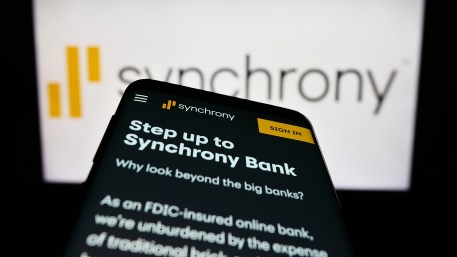What a difference Walmart makes. That’s one of the takeaways from our focus for this week’s app provider rankings: Credit card apps. MySynchrony led our most recent sweep of data on app usage and found that its recent enhanced relationship with Walmart could have been the driving factor behind a four-point gain for 55 total points.
The PYMNTS.com Credit Card Apps page offers a monthly ranking of smartphone Credit Card Apps, assessing them based on publicly available information and exclusive app usage data, helping users identify the top performers in the market. The ranking aims to provide precise insights into app performance, aiding stakeholders in making informed decisions. The operative decision for Synchrony and Walmart tracks back to early June when the two companies announced a significant expansion for both the OnePay Walmart-allied fintech and Synchrony’s retail credit business.
Under the deal, Synchrony will serve as the exclusive issuer of OnePay’s new Walmart cards, which will be embedded directly into the OnePay app and operate on Mastercard’s global network. The partnership makes OnePay, backed by Walmart and Ribbit Capital, a new contender in the digital credit ecosystem, extending its product suite beyond debit, savings and loans to include credit cards that can be used both inside and outside Walmart stores.
The collaboration aims to blend retail reach with fintech speed. Walmart CFO John David Rainey said the new program adds “choice and value” for customers seeking a more seamless digital experience, while Synchrony CEO Brian Doubles called it a move toward “greater innovation and new credit experiences.” OnePay CEO Omer Ismail said the initiative would offer consumers a transparent and rewarding credit option, part of OnePay’s goal to let users manage all aspects of their finances in one place. The partnership will introduce both a general-purpose Mastercard and a private-label Walmart card, designed to boost loyalty and spending while deepening Synchrony’s foothold in retail finance.
Second place, with a three-point jump, was Capital One. That rise could be due to the publicity surrounding its merger with Discover, which was approved by regulators in May. It’s an interesting development because the companies, for now, are keeping separate profiles. Both companies’ FAQs instruct customers to keep using their existing logins and respective mobile apps; Discover benefits don’t transfer to Capital One accounts (and vice versa), and Discover servicing isn’t handled in Capital One channels. That guidance implies no immediate app consolidation.
On Capital One’s July earnings call, management said integration work includes moving Discover onto Capital One’s tech stack and “integrating their products and experiences,” with costs trending higher than the original budget, which are typical signals of a multiphase, multiquarter integration rather than a near-term app merge.
Advertisement: Scroll to Continue
Third place went to another interesting story: Barclay’s. Though it’s an international bank it posted a two-point gain for a total score of 62. This could be the result of some positive reviews. Barclays remains a significant player in the U.S. credit card market, but unlike larger domestic issuers, it no longer offers cards under its own name.
According to NerdWallet’s Best Barclays Credit Cards review, the bank’s American portfolio today is made up entirely of co-branded partnerships with travel, retail and membership organizations. That includes airline cards for JetBlue, Frontier, Hawaiian, Breeze and Lufthansa; hotel cards for Wyndham; retail cards for Gap Inc. brands and Barnes & Noble; and affinity cards such as AARP and Upromise. Barclays’ American Airlines Aviator line, once a major part of its portfolio, stopped taking new customers in October 2025 as Citi assumed that business. The bank still issues cards under the Mastercard and Visa networks but focuses on specialized rewards programs tied to its partners.
While U.K. consumers still recognize the Barclays name on credit cards, the brand’s U.S. presence now depends almost entirely on those partner relationships. The review notes that Barclays once offered its own “Barclaycard” products, such as the Arrival Plus® and CashForward™ cards, but it no longer accepts applications for any proprietary U.S. cards. Its co-branded strategy lets the bank maintain scale without competing head-to-head with larger U.S. retail issuers. For American consumers, that means any Barclays-issued card they see — from a JetBlue Plus Card to a Wyndham Earner® Plus Card — belongs to a partner brand rather than a Barclays-branded product.


